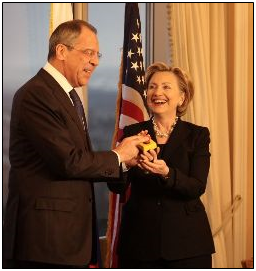By Natalia Castro
Senate Judiciary Committee Chairman Chuck Grassley (R-Iowa) is calling upon Attorney General Jeff Sessions to assist him in ridding the federal government of the corruption the Obama Administration perpetuated. After recent news stories surfaced highlighting an ethically questionable business deal which gave the Russian nuclear industry significant control over the U.S. uranium supply, Grassley wants Sessions to allow an FBI informant alleging that a Justice Department prosecution of a Russian company engaged in bribery was slowed down to grease the wheels of the Uranium One deal.
In a breaking news story this week published in The Hill this week, John Solomon and Alison Spann explain, “Rather than bring immediate charges in 2010, however, the Department of Justice (DOJ) continued investigating the matter for nearly four more years, essentially leaving the American public and Congress in the dark about Russian nuclear corruption on U.S. soil during a period when the Obama administration made two major decisions benefiting Putin’s commercial nuclear ambitions.”
The deal allowed a Russian state-owned corporation to acquire 20 percent of the U.S. uranium supply — and funneled millions to the Clinton Foundation. Consider the timeline.
It began on June 8, 2010, when Uranium One announced their intention to broker a deal with the United States to acquire notably more uranium supply. Just a day later on June 9, 2010, husband to the serving Secretary of State and former President Bill Clinton was hired to give a speech for $500,000 to the Russian bank Renaissance Capital, which occurred on June 29, a bank that would later talk up uranium markets and even promote Uranium One stocks.
As the New York Times of April 2015 reported, “As the Russians gradually assumed control of Uranium One in three separate transactions from 2009 to 2013, Canadian records show, a flow of cash made its way to the Clinton Foundation. Uranium One’s chairman used his family foundation to make four donations totaling $2.35 million. Those contributions were not publicly disclosed by the Clintons, despite an agreement Mrs. Clinton had struck with the Obama White House to identify all donors publicly. Other people with ties to the company made donations as well.”
As Sarah Carter explains in her comprehensive article investigating the matter, “The deal which required approval by [the Committee on Foreign Investment] CFIUS, an inter-agency committee who reviews transactions that leads to a change of control of a U.S. business to a foreign person or entity that may have an impact on the national security of the United States. At the time of the Uranium One deal the panel was chaired by then-Treasury Secretary Timothy Geithner and included then-Secretary of State Hillary Clinton and then-Attorney General Eric Holder.” The committee is supposed to ensure transactions that lead to a change of control of a business to a foreign person or entity does not negatively impact national security of the United States.
While the transaction moved forward, there was one problem. By 2010 when the deal was in its infant stages, the FBI informant claims the agency already had more than enough evidence to halt the transaction for obvious corruption and bribery.
The case was being led by some familiar faces: Maryland U.S. Attorney Rod Rosenstein, who now serves as Trump’s deputy attorney general, and Assistant FBI Director Andrew McCabe, who is currently the deputy FBI director, led the investigation.
In the three-year period, while the investigation was oddly stalled, the Clinton foundation was fueled.
This transaction clearly generated some unanswered questions, but the individual with the answers is being silenced.
The FBI informant who produced information to Carter and Solomon cannot testify before Congress because of a nondisclosure agreement and threats he received from the Obama Administration, Grassley is encouraging Sessions to lift this gag order to give the informant a chance to testify.
The informant’s lawyer, Victoria Toensing, has been speaking on his behalf encouraging Sessions to life the order as well, she explains, “My client has specific information about contributions and bribes to various entities and people in the United States, but he cannot go any further than that because he has not been released from his non disclosure agreement… In 2016 he filed a civil action [to life the agreement] and he was threatened by the Loretta Lynch Justice Department..who claimed that his liberty would be in jeopardy.”
She continues to note, “Chairman Grassley sent me a letter and said he wants my client to be interviewed, so what is the Justice Department going to do because it is unconstitutional for the executive branch to tell somebody not to give information to the legislative branch.”
The real question is why would the Justice Department block this testimony? What have they got to hide?
In a statement, Americans for Limited Government President Rick Manning urged the whistleblower’s testimony: “The first step Attorney General Jeff Sessions must take is to clear the whistleblower to testify about the corruption that he or she is alleging. Only through that testimony and subsequent thorough investigation led by Sessions, not involving any of the accused, can the interests of the U.S. government and its people be served. If the Russians exerted influence at the highest levels of the Justice Department and the FBI in order to obtain approval of the takeover of 20 percent of the U.S. uranium reserves, then that sale should be nullified and the people who facilitated it should be imprisoned.”
Grassley is taking the right steps to restore the rule of law in the country; now Sessions must follow the constitution and assist him by lifting this gag order. This will finally provide the real Russia corruption story; the story of the Obama Administration and Hillary Clinton utilizing bribery to fund their interests.
Natalia Castro is a contributing editor for Americans for Limited Government
Correction: Renaissance Capital later promoted Uranium One as a stock buying opportunity, not former President Bill Clinton.







